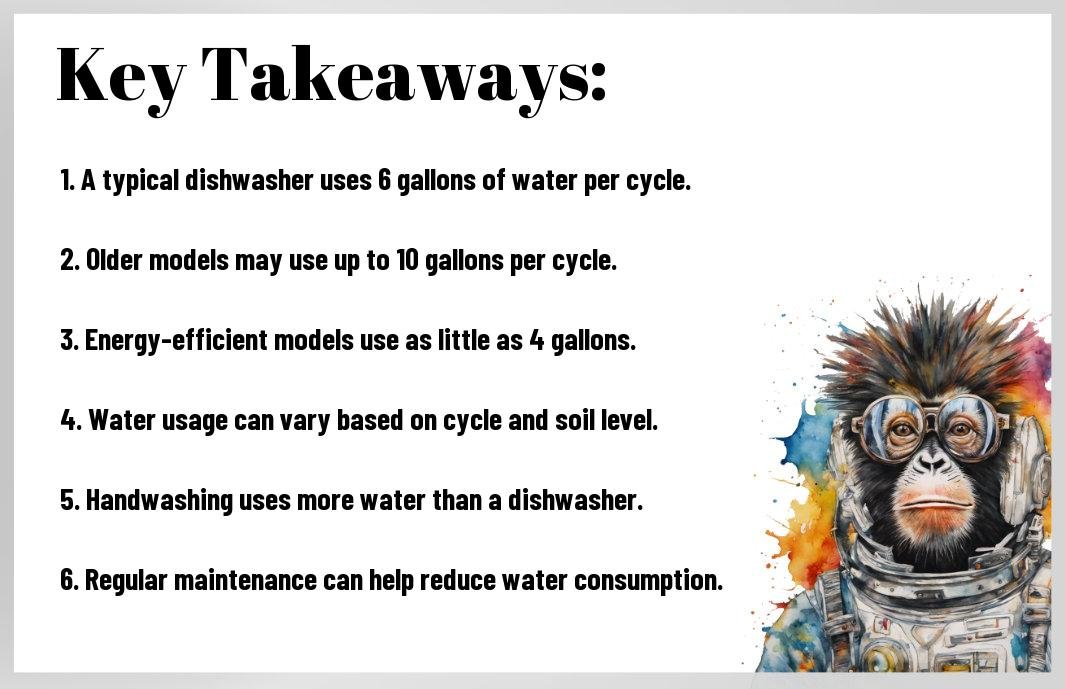Curious as to how much water your dishwasher is really using during that one hour cycle? It’s important to understand the environmental impact as well as the effect on your water bill. You may be surprised to learn that the average dishwasher uses about 6 gallons of water per cycle, while older models can use as much as 10 gallons. That’s a significant amount of water being used, which can have a negative impact on both the environment and your wallet. However, newer, more energy-efficient models are available that use about 4 gallons per cycle, saving you both water and money in the long run. Understanding the water usage of your dishwasher can help you make informed decisions about when and how to use it, ultimately making a positive impact on both your budget and the planet.
Key Takeaways:
- Standard dishwasher typically uses around 6-10 gallons of water per cycle.
- A water-efficient dishwasher can use as little as 3 gallons per cycle.
- Running a dishwasher once a day can contribute to significant water usage over time.
- Pre-rinsing dishes before loading the dishwasher can increase water usage significantly.
- Using a full load in the dishwasher can help maximize water efficiency.
- Repairing any leaks or malfunctions in the dishwasher can help conserve water usage.
- Choosing a dishwasher with a Energy Star rating can help ensure water efficiency.

Background on Dishwasher Technology
If you’ve ever wondered how your dishwasher works and how much water it uses, it’s important to understand the technology behind it. Dishwashers have evolved significantly over the years in terms of their efficiency and water consumption. Let’s take a closer look at the background of dishwasher technology to better understand this household appliance.
Evolution of Dishwasher Efficiency
Over the years, there has been a major focus on improving the efficiency of dishwashers. This includes advancements in the design of spray arms, water filtration systems, and the effectiveness of detergents. Modern dishwashers are equipped with sensors and smart technology that help optimize the use of water and energy to ensure a thorough and efficient cleaning process while using the minimum amount of water possible.
Factors Affecting Dishwasher Water Consumption
Several factors can affect the water consumption of your dishwasher. These include the age and type of your dishwasher, the efficiency of the model, and your personal usage habits. Additionally, the cleanliness of your dishes and the type of detergent you use can impact the amount of water needed for a cycle. Factors such as the water pressure in your home and the temperature of the water also play a role in determining water usage. This means that there are several variables to consider when trying to optimize the water consumption of your dishwasher.
- Dishwasher efficiency
- Age and type of dishwasher
- Personal usage habits
- Cleanliness of dishes and type of detergent
This knowledge will help you make informed decisions in using your dishwasher more efficiently and minimizing water usage.
Calculating Water Use in a 1 Hour Dishwasher Cycle
For many homeowners, knowing how much water their dishwasher uses during a single cycle is an important factor in their decision-making process when considering energy-efficient appliances. Water usage can impact both your monthly utility bills and your overall carbon footprint. So, how much water does a 1-hour dishwasher cycle use? Let’s explore the calculations and factors involved in determining water consumption in a typical dishwasher cycle.
Average Water Usage Metrics
On average, a standard dishwasher uses approximately 6 gallons of water per cycle. However, this figure can vary depending on several factors such as the age and efficiency of your dishwasher, the soil level of your dishes, and the specific model and make of your appliance. More modern, energy-efficient dishwashers are designed to use as little water as possible while still delivering clean dishes. By choosing a high-efficiency dishwasher, you can significantly reduce your water usage without sacrificing performance.
Breakdown of Water Use by Dishwasher Model
Your dishwasher’s water usage may also be influenced by its specific model and brand. Some manufacturers offer models with advanced water-saving features, such as sensor technology that adjusts water usage based on the load size and soil level of your dishes. In contrast, older or less efficient models may use significantly more water to achieve the same results. When shopping for a new dishwasher, be sure to review the manufacturer’s specifications and look for Energy Star certified models, which are designed to meet strict energy efficiency guidelines, including water usage.
Comparison with Manual Washing
Not all dishwashers are created equal, and some may use more water in a 1-hour cycle than others. However, on average, a dishwasher uses between 4 to 6 gallons of water per cycle. This is fairly reasonable compared to the amount of water you might use if you were to wash dishes by hand. When washing dishes by hand, you are likely to use much more water than necessary, especially if you leave the tap running while scrubbing and rinsing each dish.
| Dishwasher | Manual Washing |
|---|---|
| 4-6 gallons per cycle | Up to 27 gallons per load |
Water Used in Hand Washing Dishes
When you wash dishes by hand, it’s easy to lose track of how much water you’re using. You may leave the faucet running continuously while washing and rinsing each dish, which can lead to a significant amount of water waste. In fact, the average faucet flows at a rate of 2 gallons per minute, meaning that it’s easy to use up to 27 gallons of water for a single load of dishes washed by hand.
Efficiency and Environmental Impact
When it comes to efficiency and environmental impact, using a dishwasher is the clear winner. Not only does it use less water than washing dishes by hand, but it also uses less energy, especially if you run it with a full load. By conserving water and energy, you are reducing your environmental footprint and lowering your water and energy bills in the process.
Conservation Strategies
Keep in mind that conserving water doesn’t just benefit the environment, it also saves you money on utilities. There are a few key strategies you can use to reduce the amount of water your dishwasher consumes.
Tips for Reducing Dishwasher Water Use
When operating your dishwasher, make sure to scrape off excess food from your dishes instead of rinsing them. Pre-rinsing can waste up to 20 gallons of water before the wash cycle even begins. Load your dishwasher to full capacity before running it, and use the eco-friendly or energy-saving mode if available. Also, consider using a detergent that is specifically designed to work well in low-water conditions. The less water you use, the less energy you’ll need to heat it, too. The result? Lower utility bills and a smaller environmental footprint.
- Scrape off excess food before loading
- Run the dishwasher at full capacity
- Use the eco-friendly mode
- Choose a low-water detergent
The overall impact of these changes towards water conservation can be significant.
Innovations in Water-Saving Dishwashers
Manufacturers are continuously improving dishwasher technology to be more efficient with water usage. Many modern dishwashers come equipped with sensor technology that automatically adjusts the water usage based on the load size and soil level. This means that your dishwasher will use exactly the right amount of water for each particular load, minimizing excess water consumption. Additionally, some models feature recirculating systems that reuse the final rinse water for the next wash cycle, further reducing overall water usage. Investing in a water-efficient dishwasher can greatly reduce your water consumption over time, while still getting your dishes sparkling clean.
Conclusion
With this in mind, it is important to consider the water usage of your dishwasher, especially during a 1-hour cycle. On average, a dishwasher uses about 6-10 gallons of water per cycle, with older models possibly using more. It’s essential to be mindful of your water usage, as excessive consumption can impact both the environment and your utility bills. To minimize water usage, consider using the “Eco” or “Quick Wash” settings on your dishwasher, and only run it when it’s fully loaded. By implementing these small changes, you can contribute to water conservation efforts while also saving money in the long run. Remember, every drop counts, and being conscious of your water usage is a simple yet impactful way to make a difference in your household and beyond.
FAQ
Q: How much water does a 1 hour dishwasher cycle use?
A: On average, a 1-hour dishwasher cycle uses about 6 to 10 gallons of water, depending on the make and model of the dishwasher.
Q: Is it more water-efficient to wash dishes by hand or use a dishwasher?
A: Using a dishwasher is generally more water-efficient than washing dishes by hand, as long as the dishwasher is fully loaded and you are using a modern, energy-efficient model.
Q: Can I save water by using a shorter dishwasher cycle?
A: Yes, using a shorter dishwasher cycle can save water, but it may not effectively clean heavily soiled dishes. It’s best to use the appropriate cycle for the level of soiling on your dishes.
Q: Does using the “rinse hold” feature on my dishwasher save water?
A: No, the “rinse hold” feature does not save water. It uses additional water to keep dishes moist until a full load is ready to be washed.
Q: How can I reduce water usage when running my dishwasher?
A: To reduce water usage, make sure your dishwasher is fully loaded before running a cycle, scrape excess food off dishes instead of rinsing, and choose the appropriate cycle for your load.
Q: Are there any water-saving features in newer dishwasher models?
A: Yes, many newer dishwasher models are equipped with water-saving features such as sensors that adjust water usage based on the level of soiling and water-efficient spray arms.
Q: How can I be more environmentally friendly when using my dishwasher?
A: To be more environmentally friendly, consider using energy-efficient and water-saving settings on your dishwasher, and only run the dishwasher when it is fully loaded. Additionally, look for ENERGY STAR certified models when purchasing a new dishwasher.
